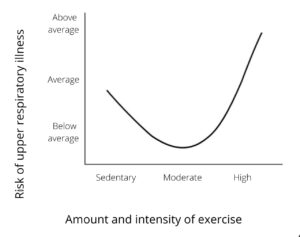Does exercise have any impact on our immune system? This question is being asked more and more as the novel coronavirus spreads. Well it does boost or rather stimulate your immune system! But there is a catch here-Not all exercise is completely helpful to your immune system—especially with a viral threat lurking outside.
In this Covid 19 pandemic while many of us take precautions by frequently washing our hands, sanitizing, wearing a mask and social distancing, another important aspect to support our overall health is regular exercise. When all of us are restricted in our movements attending online classes and working from home, even a short break from sitting by doing a few minutes of physical activity like walking or stretching can ease muscle strain. Regular physical activity has numerous benefits like managing your body weight, improving muscle and bone health, boosting stamina and reducing the risk of chronic diseases along with a positive impact on our mental health, cognitive functioning and memory. It also releases endorphins that make you feel happier and improve overall feelings of well being.
 Physical activity reduces the chances of getting sick as it may help flush bacteria out of the lungs and airways. The brief rise in body temperature during and right after exercise may prevent bacteria from growing. This temperature rise may help the body fight infection better.
Physical activity reduces the chances of getting sick as it may help flush bacteria out of the lungs and airways. The brief rise in body temperature during and right after exercise may prevent bacteria from growing. This temperature rise may help the body fight infection better.
As per the view of Dr. David Nieman, a Professor in the department of Biology at Appalachian State University and Director of the University’s Human Performance Laboratory, “People only have a small number of immune cells circulating around the body which prefer to hang out in lymphoid tissues and organs like the spleen, where your body kills viruses, bacteria, and other microorganisms that cause disease. Since exercise increases blood and lymph flow as your muscles contract, it also increases the circulation of immune cells, making them roam the body at a higher rate and at higher numbers.” [Source: Health]
 Dr. David Nieman further added, “Specifically, exercise helps to recruit highly specialized immune cells—such as natural killer cells and T cells which find pathogens like viruses and wipe them out. When immune cells try to function with inflammation, it puts the immune system in a chronically inflamed state too, in the body.” This whole kickstart to the immune system is only temporary—it lasts about three hours, but it occurs after each bout of moderate exercise says Nieman. [Source: Health]
Dr. David Nieman further added, “Specifically, exercise helps to recruit highly specialized immune cells—such as natural killer cells and T cells which find pathogens like viruses and wipe them out. When immune cells try to function with inflammation, it puts the immune system in a chronically inflamed state too, in the body.” This whole kickstart to the immune system is only temporary—it lasts about three hours, but it occurs after each bout of moderate exercise says Nieman. [Source: Health]
The impact of a single bout of exercise on the immune system depends on the exercise intensity. So does vigorous exercise stimulate the immune system to a greater extent? Well heavy intense exercise can transiently suppress immune function up to three hours post-exercise which may lead to an increased susceptibility to upper respiratory illness, but this immunosuppression is transit and returns to normal after a few hours. Taking together the suppression in humoral and cellular immunity immediately post exercise has led to the Open Window Hypothesis according to which one’s susceptibility to infection is likely greater during the post exercise recovery period. Possible mechanisms for this transient suppression in immune function after exercise centre around the elevation of several stress hormones including the adrenal hormones of cortisol, epinephrine, and norepinephrine, which are known to be immunosuppressive.
 Now a very common question people have is if they should exercise while they are sick. The general rule of thumb is to rest and not exercise if your symptoms are below the neck like chest congestion, a hacking cough, upset stomach, fever, fatigue or widespread muscle aches. If you have symptoms above the neck, such as a simple head cold, it is generally okay to engage in light easy exercise as tolerated. However, if you find even easy exercise makes you feel worse, then you should stop exercising and rest until you have recovered. As you start to feel better, you can gradually return to your normal exercise pattern.
Now a very common question people have is if they should exercise while they are sick. The general rule of thumb is to rest and not exercise if your symptoms are below the neck like chest congestion, a hacking cough, upset stomach, fever, fatigue or widespread muscle aches. If you have symptoms above the neck, such as a simple head cold, it is generally okay to engage in light easy exercise as tolerated. However, if you find even easy exercise makes you feel worse, then you should stop exercising and rest until you have recovered. As you start to feel better, you can gradually return to your normal exercise pattern.
Last but not the least regular moderate exercise can reduce the negative effects of stress on our immunity and pump up our endorphin levels which have a positive impact on the immune system of our body.




